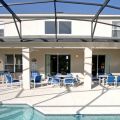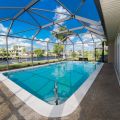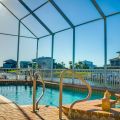9/22/2021
Pool Safety Tips for Hurricane Season

8/17/2022
Florida experiences hurricane season from June 1 to November 30. Hurricanes may cause damage to homes, businesses, and other structures, as well as our swimming pools. In addition to the risk for damage, waste including dirt, mud, silt, and germs may contaminate swimming pools.
Aluminum Master LLC is here to assist you with preparations when a major tropical storm is forecasted for your region. Below are some useful tips for protecting your pool from possible problems before, during, and after hurricane.
Aluminum Master LLC is here to assist you with preparations when a major tropical storm is forecasted for your region. Below are some useful tips for protecting your pool from possible problems before, during, and after hurricane.
Before Hurricane:
Below are some tips on what you need to do before hurricane hits in your area:
- Don't Drain Your Pool - The pool's weight is maintained by the pool's water content. Pressure from abundant ground water induced by severe rainfall might cause an empty pool to float or resurface from the earth. Additionally, maintaining water in your pool, despite the risk of contamination, will make cleanup simpler compared to an empty pool.
- Remove Loose Items - Remove branches and other hazards around your patio and pool. In severe winds, chairs, tables, pool toys, and other unsecured objects may become hazardous projectiles. They should be kept indoors, away from the storm. Never use the pool as a storm shelter for your belongings. This may cause damage to the items and severe metal staining issues in your pool.
- Shock your pool - Add granular pool shock to avoid contamination from debris and excessive storm water. In addition, it's a good idea to add a significant amount of algaecide to the pool in order to swiftly remove any organic impurities that enter the water.
- Turn Off Power and Protect Electric Pool Equipment - Before a hurricane, always remember to turn off all electricity at the circuit breakers. Any exposed electrical components, such as pump motors, should be carefully wrapped in waterproof plastic wrap and tied in place tightly to prevent sand and water from entering. If flooding is forecast, remove and store items and equipment to a dry higher ground.
- Be extra cautious if your pool is made of vinyl or fiberglass.
- Never place glass objects in your pool; they must be brought inside.
- Do Not Cover Your Pool - Storms may result in fallen branches and other debris that can damage pool coverings. It is simpler to remove pool waste than it is to replace the cover. Prevent unintended damage and avoid dealing with a difficult removal if the cover is weighed down with water and dirt.
- Protect Your Safety Fence or Screen Enclosure - If you have a pool safety fence, we suggest installing a vent to allow wind to pass through and avoid damage. Whenever necessary, remove screen panels from opposing sides of an enclosure.
During Hurricane:
- Do Not Use Your Pool - Always remember not to use your pool before, during, or after a hurricane. Lightning, strong winds, and other hazards are unexpected.
- Do Not Go Outdoors - don't go outside just to inspect or alter anything during hurricane; instead, inspect the damage afterwards.
- Remember to secure your swimming pool and yourself during hurricane season.
After Hurricane:
- When the hurricane stops, do not instantly restart your pumps when the storm has gone.
- Remove hurricane waste from the pool. Use a net skimmer, or pool rake.
- Do not use your standard pool vacuum equipment or pool pumps, as these may block the pipes.
- Ensure that everything is dry before handling any electrical equipment after the hurricane.
- Ensure that your circuit breakers are turned off before trying to reconnect electrical equipment, such as pump motors.
- Check for appropriate connections in the wiring. Electric motors that have been exposed to water should be inspected by an expert.
Naples, FL Screen and Aluminum Repair Service Provider
Florida can present unique challenges when it comes to maintaining your pool enclosure or screened-in lanai. The high humidity and extreme weather Floridians know all too well can cause rusting of the nuts and bolts, ripped screens, and damaged enclosures. When it comes to servicing a ripped pool screen or repairing a damaged enclosure, our skilled and knowledgeable Aluminum Master LLC team is the best choice for the job.
We offer several types of screens for screen repair:
- Standard 18/14 mesh screen
- 20/20 mesh screen, a finer mesh which offers better protection from the smaller Florida bug species
- Super Screen, the strongest rated grade screen available which carries a 10 year written manufacturer’s warranty; perfect from stray golf ball protection.
- Florida Glass – A vinyl coated screen usually used on the bottom of enclosures to keep water and dirt out, as well as create a sense of privacy.
Call Aluminum Master LLC at (239) 449-9934 today for a free estimate. We also give our services in Bonita Springs, FL, Estero, FL, and Marco Island, FL. Visit our website now fore more details.
Other articles and publications:
Enhance your lanai screen enclosures and pool cages with different styles and designs. Contact Aluminum Master in Estero, FL at (239)449-9934.
Enhance your pool cages which come in different styles and designs, contact Aluminum Master in Immokalee, FL at (239)449-9934.
7/22/2021
Articles and publications of other companies:
Essential steps must be taken to protect the home from a fire incident this Thanksgiving. ServiceMaster by Wright discusses important fire safety tips to prevent residential fires in this article.
11/24/2020
During holidays, the swimming pools should be secured to make sure that nobody incurs an accident such as but not limited to a fall, slippage and other similar incidents.
12/11/2019
To save money and keep holiday cooking and celebrations free from the threat of a fire, ServiceMaster by Wright has compiled these cooking safety tips and steps to properly dispose of cooking oil.
11/24/2020
Having healthy skin is simple when you follow these basic tips. For all other dermatology and cosmeceutical needs, do not settle for anything less than Myerlee Pharmacy, your dermatology expert.
1/9/2020
The holidays are here! To prepare your swimming pool for gatherings and celebrations, here are some useful tips!
12/19/2018
It doesn’t mean that if there is a storm surging by or hurricane that is about to come, that is the only time you are going to do the pool enclosure. Being prepared for a calamity can be a big help.
6/7/2019





